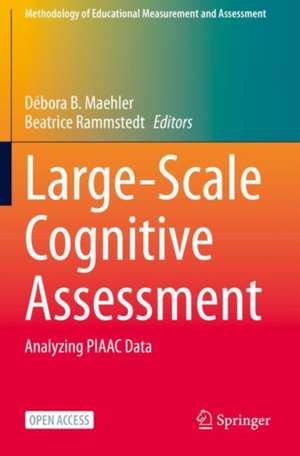Large-Scale Cognitive Assessment: Analyzing PIAAC Data: Methodology of Educational Measurement and Assessment
Editat de Débora B. Maehler, Beatrice Rammstedten Limba Engleză Paperback – 18 sep 2020
| Toate formatele și edițiile | Preț | Express |
|---|---|---|
| Paperback (1) | 295.43 lei 38-44 zile | |
| Springer International Publishing – 18 sep 2020 | 295.43 lei 38-44 zile | |
| Hardback (1) | 426.72 lei 22-36 zile | |
| Springer International Publishing – 28 iul 2020 | 426.72 lei 22-36 zile |
Preț: 295.43 lei
Nou
Puncte Express: 443
Preț estimativ în valută:
56.53€ • 59.18$ • 46.78£
56.53€ • 59.18$ • 46.78£
Carte tipărită la comandă
Livrare economică 02-08 aprilie
Preluare comenzi: 021 569.72.76
Specificații
ISBN-13: 9783030475178
ISBN-10: 3030475174
Pagini: 290
Ilustrații: VII, 290 p. 110 illus., 39 illus. in color.
Dimensiuni: 155 x 235 mm
Ediția:1st ed. 2020
Editura: Springer International Publishing
Colecția Springer
Seria Methodology of Educational Measurement and Assessment
Locul publicării:Cham, Switzerland
ISBN-10: 3030475174
Pagini: 290
Ilustrații: VII, 290 p. 110 illus., 39 illus. in color.
Dimensiuni: 155 x 235 mm
Ediția:1st ed. 2020
Editura: Springer International Publishing
Colecția Springer
Seria Methodology of Educational Measurement and Assessment
Locul publicării:Cham, Switzerland
Cuprins
Chapter 1. Large-Scale Assessment in Education: Analysing PIAAC Data (Débora B. Maehler and Beatrice Rammstedt).- Chapter 2. Design and Key Features of the PIAAC Survey of Adults (Irwin Kirsch, Kentaro Yamamoto, and Lale Khorramdel).- Chapter 3. Plausible Values – Principles of Item Response Theory and Multiple Imputations (Lale Khorramdel, Matthias von Davier, Eugenio Gonzalez, and Kentaro Yamamoto).- Chapter 4. Adult Cognitive and Non-Cognitive Skills: An Overview of Existing PIAAC Data (Débora B. Maehler and Ingo Konradt).- Chapter 5. Analysing PIAAC Data with the International Data Explorer (IDE) (Emily Pawlowski and Jaleh Soroui).- Chapter 6. Analysing PIAAC data with the IDB Analyzer (SPSS and SAS) (Andrés Sandoval-Hernández and Diego Carrasco).- Chapter 7. Analysing PIAAC Data with Stata (François Keslair).- Chapter 8. Analysing PIAAC Data with Structural Equation Modelling in Mplus (Ronny Scherer).- 9. Using EdSurvey to Analyse PIAAC Data (Paul Bailey, Michael Lee, Trang Nguyen, Ting Zhang).- Chapter 10. Analysing Log File Data from PIAAC (Frank Goldhammer, Carolin Hahnel, and Ulf Kroehne).- Chapter 11. Linking PIAAC Data to Individual Administrative Data: Insights from a German Pilot Project (Jessica Daikeler, Britta Gauly, and Matthias Rosenthal).
Textul de pe ultima copertă
This open access methodological book summarises existing analysing techniques using data from PIAAC, a study initiated by the OECD that assesses key cognitive and occupational skills of the adult population in more than 40 countries. The approximately 65 PIAAC datasets that has been published worldwide to date has been widely received and used by an interdisciplinary research community. Due to the complex structure of the data, analyses with PIAAC datasets are very challenging. To ensure the quality and significance of these data analyses, it is necessary to instruct users in the correct handling of the data. This methodological book provides a standardised approach to successfully implementing these data analyses. It contains examples of and tools for the analysis of the PIAAC data using different statistical approaches and software, and it offers perspectives from various disciplines. The contributing authors have hands-on experience of using PIAAC data, and/or they have conducted data analysis workshops with these data.
Caracteristici
First standardized knowledge transfer on how to analyze PIAAC data Makes the data from PIAAC and the numerous additional studies transparant to potential users Provides numerous examples how the rich and valuable datasets from PIAAC can be used for scientific research questions













